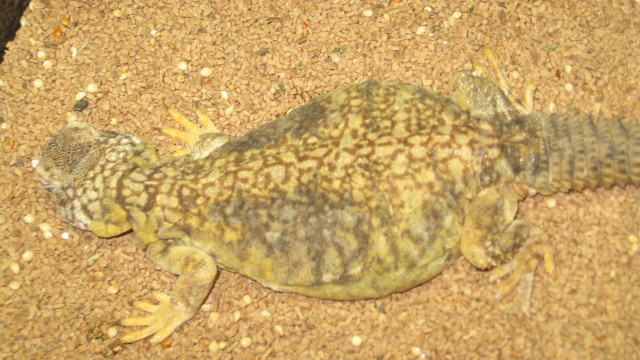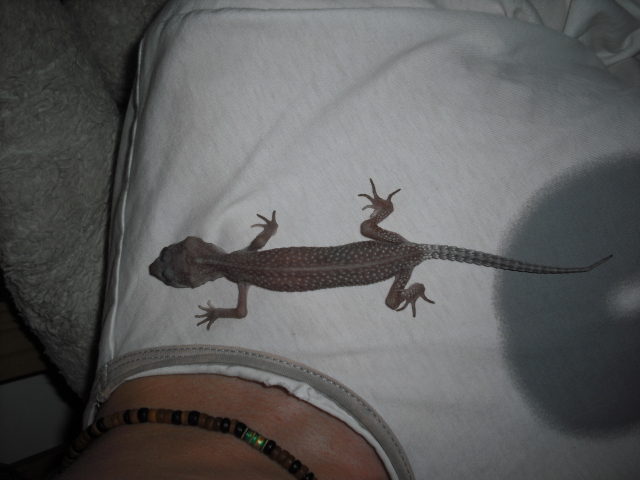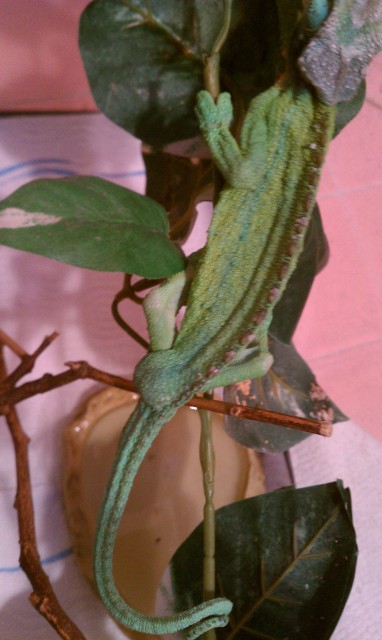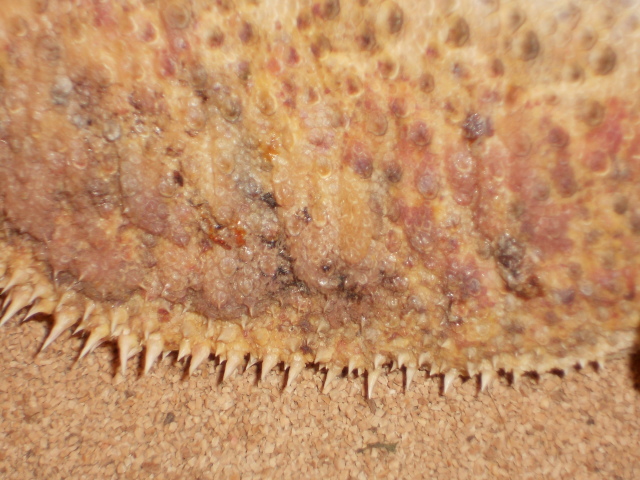QuestionQUESTION: My male green iguana (rhinolopha-11 years old)suddenly can not keep his tongue in this mouth. Usualy sleeps with it sticked out for 2 cm.During the day only a few times he can close his mouth with his tongue inside. It seems that his tongue is useless while eating. It is not swollen and it has a healthy pinky color. My igi is not lethargic at all it's willing to eat but not able to swallow. His neck is extremely swollen on both sides. It looks like when he is angry on somebody. The inside of the mouth has no injury but the saliva is very thick (still transparent not yellowish).I am feeding him with a plastic tube attached to a seringe.Even mashed,..the food is swallowed slowly and partially. I succeed feeding because he is angry on me and opens his mouth when approaching my hand.A vet injects him 40 ml saline / day under the skin and an antibiotic to which the swelling is not responding. I am worried because this is the second week and not eating.He has now 3 kg but there are no signs of lethargy or other to make me think it can be MBD.
ANSWER: Hi Eva, Your description reminded me of a case history in one of my veterinary books written by the pioneering reptile vet Dr. Fredric Frye. The book is a series of case histories of the fairly common conditions that vets may see in reptile medicine. One case was a male iguana, on an excellent diet, that had developed a mass in the lower jaw and throat and could no pick longer up food or swallow. The diagnosis was ossifying fibroma, a type of tumour that tends to affect mandibular bone. It needed to be surgically removed but the prognosis was described as favourable in these cases and the condition described as self limiting. The condition affects only mandibular bone and not the long bones of the limbs. There were a couple other mentions of ossifying fibroma in green iguanas on a couple vet sites that I could not access without being a member so it does sound like this condition is not uncommon.
This fibroma presented as a firm mass in the lower jaw area.
The only other case with something similar was a case of "intermandibular cellulitis" in two snakes which appeared as a soft swollen mass in the lower jaw/throat area. This was caused by bacteria and was treated with aggressive antibiotic therapy and fluid replacement.
---------- FOLLOW-UP ----------
QUESTION: Thank's for the answer. In the mean time my igi got hydration with 50/50 % glucose (dextrose)/ Ringer saline subcutaneous. Also B12 vitamin in the tail muscle and Gentamicine (antibiotic) shots for 4 days 1/24 hours (7 degrees from an 1ml seringe). I force feed him with mashed leafs and carrots + ample&carrot baby food. After stopping Antibiotic,...on the 6th day started to voluntarily swallow (slowly and with difficulty some salad. I was extremely happy that she forced down her throat some food. In the mean time some blood was taken. A bacteria was found but which determined to be destroyable with that Gentamicine. From the small amount of blood unfortunately only T4 (lower than 1 microgram/ deciliter (dl)could be determined and the TGO = 156 and the TGP = 136. Does these results express something. I'm desperately trying to heal her. The fact is that We (me and my iguana) are living in Romania (Europe) and vets are not to qualified in treating reptiles. I'd like to collect as much info as I can and together with the vet's knowledge to repair my pet. Waiting for your suggestion....your's sincerely...Reptilla
AnswerHello Eva, I'm glad to hear that you have noticed some improvement. I wish I could help you more but I am really not at all familiar with the normal biochemistry results for iguanas. I tried to find the normal levels for the enzymes you mentioned (which I believe translate to AST (TGO) and ALT (TGP)) but they were measured in different units then what has been reported for your iguana.
Your vet may not be experienced with iguanas but perhaps he or she could consult with one who is. I have included e-mail links for the clinics of some well known reptile vets and a consultation site for veterinarians. The first link is for Dr. Stephen Hernandez-Divers who has authored a paper on iguana biochemistry levels. The second is Dr. Douglas Mader, one of the top reptile vets in the U.S. I think it would be best if your vet (rather then you) contacted them to ask for assistance with this case. Good luck, I am really hoping that your iguana is able to return to full health. He is lucky to have such a caring and responsible owner.
http://www.vet.uga.edu/sams/courses/exotics/exoticsServices/stephenHD.php
http://www.marathonvethospital.com/caregivers.htm
http://www.seavs.com/
http://www.vin.com/VIN.plx

 Thermal burns on uromastyx
Question
thea
hello i have a three year old uro and i t
Thermal burns on uromastyx
Question
thea
hello i have a three year old uro and i t
 Leopard Not Eating
QuestionQUESTION: We have 3 leopard geckos. We have had
Leopard Not Eating
QuestionQUESTION: We have 3 leopard geckos. We have had
 My chameleon
Question
my chameloen
He is very skinny and has develop
My chameleon
Question
my chameloen
He is very skinny and has develop
 Bearded Dragon-family friend
QuestionQUESTION: Tracy- I have 2 year old beardies. On
Bearded Dragon-family friend
QuestionQUESTION: Tracy- I have 2 year old beardies. On
 California king snake
Question
Snake
Hi I bought a California king sna
California king snake
Question
Snake
Hi I bought a California king sna